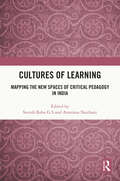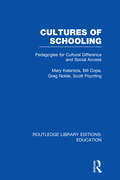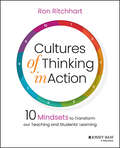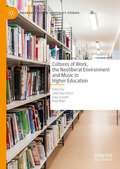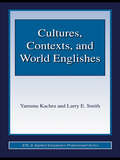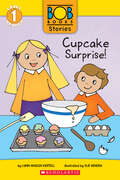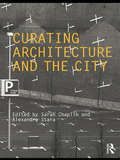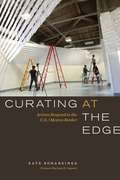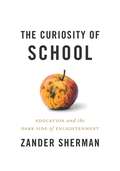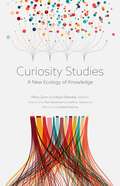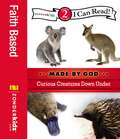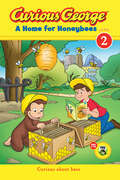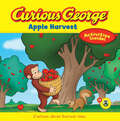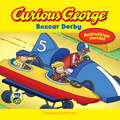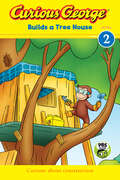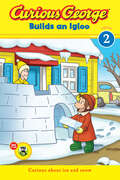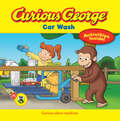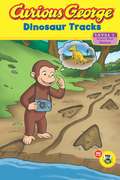- Table View
- List View
Cultures of Learning: Mapping the New Spaces of Critical Pedagogy in India
by Suresh Babu G.S Arunima NaithaniThis book looks at educational institutions and their role as sites of learning in times of moral and political chaos. It highlights the erosion of critical pedagogical traditions in universities in India and registers the ongoing responses and struggles as educational experiences.This book develops a critical approach by redefining education from the perspective of learning as a political act to experience the complex network of learning activities beyond the confines of educational institutions. It also locates caste, gender and religious hierarchies in schools and universities in India. The book explores the extremely contradictory experiences of academic spaces that have resulted in the development of uncharted sites of learning. Being mindful of these multiple strands, the authors examine the culture of learning and reflect on the space for critical learning, activism, dissent and self-reflexivity in schools and universities in India. The goal of diverse experiences of learning is to derive new meaning to the conceptions of critical pedagogy as a political act for democratising education.This transdisciplinary book will be of interest to students and researchers of education, sociology, history, political studies and public policy.
Cultures of Schooling: Pedagogies for Cultural Difference and Social Access (Routledge Library Editions: Education)
by Bill Cope Mary Kalantzis Scott Poynting Greg NobleThis volume examines the ways schools respond to cultural and linguistic diversity. A richness of accumulated experience is portrayed in this study of six Australian secondary schools; partial success, near success or instructive failure as the culture of the school itself was transformed in an attempt to meet the educational needs of its students. Set in the context of a general historical background to the development of multicultural education in Australia, a theoretical framework is developed with which to analyze the move from the traditional curriculum of cultural assimilation to the progressivist curriculum of cultural pluralism. The book analyzes the limitations of the progressivist model of multicultural education and suggests a new ‘post-progressivist’ model, in evidence already in an incipient and as yet tentative ‘self-corrective’ trend in the case-study schools.
Cultures of Thinking in Action: 10 Mindsets to Transform our Teaching and Students' Learning
by Ron RitchhartFrom leading educational researcher Ron Ritchhart, a deep dive that illuminates what the foundational mindsets needed to create cultures of thinking really looks like in action. Building on the framework presented in the best-selling Creating Cultures of Thinking, Ron Ritchhart’s new book, Cultures of Thinking in Action, takes the next step in helping readers not only understand how a culture of thinking looks and feels, but also how to create it for themselves and their learners. Arguing that no set of practices or techniques alone is sufficient to create a culture of thinking in and of itself, Ritchhart explores the underlying beliefs that motivate the creation of cultures of thinking, presenting key mindsets every educator and leader needs to embrace if they are serious about creating powerful thinkers and learners. Much more than just an instructional guide, Cultures of Thinking in Action offers readers a reflective journey into their own teaching, leading, and parentingwhile providing the foundation and concrete strategies needed to create and develop a culture of thinking for all learners. This book: Presents ten foundational mindsets of a culture of thinking Includes the latest research of the Cultures of Thinking Project Includes questions, exercises, and discussion prompts to inspire reflection by individuals and teams Provides case studies and best practice scenarios to exemplify each mindset Provides useful data collection tools to inform one’s teaching practice
Cultures of Thinking in Action: 10 Mindsets to Transform our Teaching and Students' Learning
by Ron RitchhartFrom leading educational researcher Ron Ritchhart, a deep dive that illuminates what the foundational mindsets needed to create cultures of thinking really looks like in action. Building on the framework presented in the best-selling Creating Cultures of Thinking, Ron Ritchhart’s new book, Cultures of Thinking in Action, takes the next step in helping readers not only understand how a culture of thinking looks and feels, but also how to create it for themselves and their learners. Arguing that no set of practices or techniques alone is sufficient to create a culture of thinking in and of itself, Ritchhart explores the underlying beliefs that motivate the creation of cultures of thinking, presenting key mindsets every educator and leader needs to embrace if they are serious about creating powerful thinkers and learners. Much more than just an instructional guide, Cultures of Thinking in Action offers readers a reflective journey into their own teaching, leading, and parentingwhile providing the foundation and concrete strategies needed to create and develop a culture of thinking for all learners. This book: Presents ten foundational mindsets of a culture of thinking Includes the latest research of the Cultures of Thinking Project Includes questions, exercises, and discussion prompts to inspire reflection by individuals and teams Provides case studies and best practice scenarios to exemplify each mindset Provides useful data collection tools to inform one’s teaching practice
Cultures of Work, the Neoliberal Environment and Music in Higher Education (Palgrave Critical University Studies)
by Paul Watt Sally Macarthur Julja SzusterThis edited book considers the impact of neoliberalism on music teaching, research and scholarship in a higher education context. As a subject that bears little resemblance to other university practical disciplines, and fares poorly in a model driven by economics, the book considers whether musicology is a ‘public good’ or a threatened species. It contemplates what musicology can usefully contribute to a paradigm driven by economics, and questions whether it is ever possible to recover an ideal civil subject in neoliberal music academia. Contributions investigate what it means to build music research capacity in innovative ways, such as forging cross-cultural relationships, subverting conventional notions of quality and value, replacing them with knowledges and values that guide Indigenous intellectual traditions, and whether interventions into the legacy of colonialism are truly ever possible in neoliberal higher education institutions that celebrate difference and diversitywhile reinforcing social inequities. The book also explores the relationships between gender and music, music research training and scholarship, and whether the interdisciplinarity championed by the university is ever workable. Finally, it undertakes a cross-disciplinary, new materialist reading of a canonical musical work, offering a radically new perspective. The book will appeal to students and scholars of music education, musicology, higher education studies and the creative arts more broadly.
Cultures, Communities, and Conflict
by Paul Stortz E. Lisa PanayotidisCultures, Communities, and Conflict offers provocative, cutting-edge perspectives on the history of English-Canadian universities and war in the twentieth century. The contributors explore how universities contributed not only to Canadian war efforts, but to forging multiple understandings of intellectualism, academia, and community within an evolving Canadian nation.Contributing to the social, intellectual, and academic history of universities, the collection provides rich approaches to integral issues at the intersection of higher education and wartime, including academic freedom, gender, peace and activism on campus, and the challenges of ethnic diversity. The contributors place the historical university in several contexts, not the least of which is the university's substantial power to construct and transform intellectual discourse and promote efforts for change both on- and off-campus.With its diverse research methodologies and its strong thematic structure, Cultures, Communities, and Conflict provides an energetic basis for new understandings of universities as historical partners in Canadian community and state formation.
Cultures, Contexts, and World Englishes
by Yamuna Kachru Larry E. SmithThis volume aims to familiarize readers with the varieties of world Englishes used across cultures and to create awareness of some of the linguistic and socially relevant contexts and functions that have given rise to them. It emphasizes that effective communication among users of different Englishes requires awareness of the varieties in use and their cultural, social, and ideational functions. Cultures, Contexts and World Englishes: demonstrates the rich results of integrating theory, methodology and application features critical and detailed discussion of the sociolinguistics of English in the globalized world gives equal emphasis to grammar and pragmatics of variation and to uses of Englishes in spoken and written modes in major English-using regions of the world. Each chapter includes suggestions for further reading and challenging discussion questions and appropriate research projects designed to enhance the usefulness of this volume in courses such as world Englishes, English in the Global Context, Sociolinguistics, Critical Applied Linguistics, Language Contact and Convergence, Ethnography of Communication, and Crosscultural Communication.
Cupcake Surprise! (Scholastic Reader, Level 1)
by Lynn Maslen KertellA delightful—and delicious—Scholastic Level 1 Reader from the creators of the beloved Bob Books® learn-to-read phonics box sets, perfect for reading alongside the Stage 3 Bob Books box sets, or for any child reading at Guided Reading Level H.Jack and Anna want to bake cupcakes to surprise their dad on his birthday. But surprise! They run out of flour. Surprise! Cookies fall into the batter. Surprise! Some chocolate tips into the bowl. Will the cupcakes turn out delicious? And will Dad be surprised?Bob Books Stories include:Words that children can sound out (decode); both short and long vowelsSight wordsSimple sentence structuresSimple, colorful, friendly illustrations that support children’s reading and add fun!Longer stories than the books in the Bob Books box sets, which helps children build reading enduranceBob Books has been helping children learn to read through simple phonics and playful text and illustrations for more than forty years. Your child will soon join the millions of happy kids who say, “I read the whole book!”
Cupcake: A Hyperion Read-along (The\just Grace Ser. #10)
by Charise Mericle HarperPoor Vanilla Cupcake. He's feeling a bit drab next to his fancy brothers and sisters. But when his new pal, Candle, comes along with some fresh ideas, the two hatch a plan to become the snazziest duo ever found on a plate!With an undeniably adorable hero and eye-catching design, Cupcake is sure to appeal to the sweet tooth in young readers everywhere.
Cupidity
by Caroline Goode Amy SaidensDating in high school is like reality TV. It can get pretty surreal.Between the strict social ladder (geeks' lockers left, jocks' to the right), and silly, pointless rules high school is the worst place to find a boyfriend. And Laura Sweeney is no exception. She hasn't ever had a date. Desperate times call for desperate measures. So Laura is calling in the big guns. Luckily she knows exactly the expert to call. He's a matchmaking mastermind who actually has the bow and arrow to prove it.
Curating Architecture and the City
by Sarah Chaplin Alexandra StaraAddressing the collection, representation and exhibition of architecture and the built environment, this book explores current practices, historical precedents, theoretical issues and future possibilities arising from the meeting of a curatorial ‘subject’ and an architectural ‘object’. Striking a balance between theoretical investigations and case studies, the chapters cover a broad methodological as well as thematic range. Examining the influential role of architectural exhibitions, the contributors also look at curatorship as an emerging attitude towards the investigation and interpretation of the city. International in scope, this collection investigates curation, architecture and the city across the world, opening up new possibilities for exploring the urban fabric.
Curating at the Edge: Artists Respond to the U.S./Mexico Border
by Kate BonansingaLocated less than a mile from Juárez, the Stanlee and Gerald Rubin Center for Visual Arts at the University of Texas at El Paso is a non-collecting institution that serves the Paso del Norte region. In Curating at the Edge, Kate Bonansinga brings to life her experiences as the Rubin’s founding director, giving voice to a curatorial approach that reaches far beyond the limited scope of “border art” or Chicano art. Instead, Bonansinga captures the creative climate of 2004–2011, when contemporary art addressed broad notions of destruction and transformation, irony and subversion, gender and identity, and the impact of location on politics. The Rubin’s location in the Chihuahuan desert on the U. S. /Mexican border is meaningful and intriguing to many artists, and, consequently, Curating at the Edge describes the multiple artistic perspectives conveyed in the place-based exhibitions Bonansinga oversaw. Exciting mid-career artists featured in this collection of case studies include Margarita Cabrera, Liz Cohen, Marcos Ramírez ERRE, and many others. Recalling her experiences in vivid, first-person scenes, Bonansinga reveals the processes a contemporary art curator undertakes and the challenges she faces by describing a few of the more than sixty exhibitions that she organized during her tenure at the Rubin. She also explores the artists’ working methods and the relationship between their work and their personal and professional histories (some are Mexican citizens, some are U. S. citizens of Mexican descent, and some have ancestral ties to Europe). Timely and illuminating, Curating at the Edge sheds light on the work of the interlocutors who connect artists and their audiences.
Curiosity Of School,The
by Zander ShermanIt's one thing we all have in common. We've all been to school. But as Zander Sherman shows in this fascinating, often shocking account of institutionalized education, sending your kids off to school was not always normal. In fact, school is a very recent invention. Taking the reader back to 19th-century Prussia, where generals, worried about soldiers' troubling individuality, sought a way to standardize every young man of military age, through to the most controversial debates that swirl around the world about the topic of education today, Sherman tells the often astonishing stories of the men and women-and corporations-that have defined what we have come to think of as both the privilege and the responsibility of being educated. Along the way, we discover that the SAT was invented as an intelligence test designed to allow the state to sterilize "imbeciles," that suicide in the wake of disappointing results in the state university placement exams is the fifth leading cause of death in China, and that commercialized higher education seduces students into debt as cynically as credit card companies do. Provocative, entertaining-and even educational-The Curiosity of School lays bare the forces that shape the institution that shapes all of us.
Curiosity Studies: A New Ecology of Knowledge
by Perry Zurn Arjun ShankarThe first English-language collection to establish curiosity studies as a unique field From science and technology to business and education, curiosity is often taken for granted as an unquestioned good. And yet, few people can define curiosity. Curiosity Studies marshals scholars from more than a dozen fields not only to define curiosity but also to grapple with its ethics as well as its role in technological advancement and global citizenship. While intriguing research on curiosity has occurred in numerous disciplines for decades, no rigorously cross-disciplinary study has existed—until now. Curiosity Studies stages an interdisciplinary conversation about what curiosity is and what resources it holds for human and ecological flourishing. These engaging essays are integrated into four clusters: scientific inquiry, educational practice, social relations, and transformative power. By exploring curiosity through the practice of scientific inquiry, the contours of human learning, the stakes of social difference, and the potential of radical imagination, these clusters focus and reinvigorate the study of this universal but slippery phenomenon: the desire to know. Against the assumption that curiosity is neutral, this volume insists that curiosity has a history and a political import and requires precision to define and operationalize. As various fields deepen its analysis, a new ecosystem for knowledge production can flourish, driven by real-world problems and a commitment to solve them in collaboration. By paying particular attention to pedagogy throughout, Curiosity Studies equips us to live critically and creatively in what might be called our new Age of Curiosity.Contributors: Danielle S. Bassett, U of Pennsylvania; Barbara M. Benedict, Trinity College; Susan Engel, Williams College; Ellen K. Feder, American U; Kristina T. Johnson, Massachusetts Institute of Technology; Narendra Keval; Christina León, Princeton U; Tyson Lewis, U of North Texas; Amy Marvin, U of Oregon; Hilary M. Schor, U of Southern California; Seeta Sistla, Hampshire College; Heather Anne Swanson, Aarhus U.
Curious Creatures Down Under: Level 2 (I Can Read! #Level 2)
by ZondervanThese exciting photos and facts show children the wonders of God’s creation. Includes simple text perfect for level two readers. Titles include: Rainforest Creatures; Under the Sea; Birds of the Air; Bugs, Bugs, Bugs; Freezing Friends; and Creatures Down Under. Rainforest Creatures features unusual yet familiar animals like the sloth and the tree kangaroo and facts about their habitat. Under the Sea will feature facts about sea creatures such as the giant squid, baseball fish, and the blue-ringed octopus. Birds of the Air will include facts about flying friends like the macaw, toucan, flamingo, and yellow-bellied sapsucker. Bugs, Bugs, Bugs will tell about stinkbugs, dung beetles, killer bees, and more. Creatures Down Under will tell about the platypus, kookaburra, kangaroo, and crocodile and coral. Freezing Friends will focus on Polar bears, seal, penguin, and walrus. Farm Animal Babies will focus on familiar farm animal babies, their special names, and characteristics. Forest Animal Babies will focus on fun forest animal babies like raccoons, mountain lions, and baby birds and their special characteristics. Jungle Animal Babies will focus on fun jungle animal babies like monkeys, panthers, and baby birds and their special characteristics.
Curious George A Home for Honeybees (CGTV)
by H.A. ReyThe buzz around town is that Curious George and his friend are about to be caught mis-BEE-having! In this springtime adventure based on the Emmy Award–winning PBS TV show, George and Steve find themselves in a sticky situation when they accidentally eat all of Betsy&’s delicious honeycomb for her Earth Day presentation about bees. Now they need to find a way to replace the honeycomb before Betsy gets back from dance class. They head to an Earth Day fair in the park, where they learn all about bees, beehives, and how bees make honey. All they need to do is make their own beehive and they&’ll have plenty of homemade honeycomb! But will they be able to attract enough bees in time for Betsy&’s presentation? Includes two activities that reinforce the concepts in the story. For more monkey fun, check out www.curiousgeorge.com and discover all the latest books, promotions, games, activities, and more! Now streaming on Peacock.
Curious George Apple Harvest (Curious George)
by H.A. ReyA helpful monkey causes havoc on the farm in this fun-filled story, based on the popular animated series now streaming on Peacock! While helping the Renkinses harvest their apples, George discovers a giant cider press inside the barn! As usual, George&’s curiosity gets the best of him, and he accidentally starts the machine. Suddenly all of the apples they&’ve collected are being washed, chopped, and squished into liquid! Will George be able to collect the cider and stop the machine, or will he find himself in an even stickier situation? This comical adventure is based on the Emmy-winning PBS series, now streaming on Peacock—and includes special activities.
Curious George Boxcar Derby (CGTV)
by H.A. ReyEveryone&’s favorite monkey is at the wheel in this story based on the beloved animated series! In this new storybook based on the Emmy Award-winning Curious George PBS TV show, George and his friend Allie work together to build the fastest boxcar a monkey can drive, just in time for the competition! Will their boxcar race past the finish line—or are they on a crash course? Includes fun activities! Now streaming on Peacock.
Curious George Builds a Tree House (CGTV Reader)
by H.A. ReyGeorge wants a place of his own in this storybook based on the PBS animated series now streaming on Peacock! George is tired of following the house rules—he wants a place of his own where he can draw on the walls and eat corn on the cob with his feet! So he decides to build a tree house in the yard, but quickly learns that creating a house from scratch just might take more than a pile of plywood and a handful of nails. What he needs is a design plan to make it work! This Green Light Reader based on Curious George, the Emmy Award-winning PBS TV show now streaming on Peacock, also includes bonus activities to help build on the construction theme with a matching materials game and a make-your-own sponge blocks craft.
Curious George Builds an Igloo (CGTV Reader)
by H.A. ReyCurious George wishes for a snowy home that fits all his friends! But can a small monkey make his big dreams come true? In this snowy adventure based on the Emmy Award–winning PBS TV show, Curious George can&’t wait to help his friend Bill build an igloo and sleep in it overnight. But George thinks Bill&’s igloo is too small. He decides to build his own supersized igloo—big enough for a party! Will such a big igloo be too cold for a little monkey? This fun-filled Level 2 Green Light Reader includes an activity that helps kids identify things that melt as well as instructions for making their own mini-igloo out of sugar cubes and icing. For more monkey fun, check out www.curiousgeorge.com and discover all the latest books, promotions, games, activities, and more!
Curious George Car Wash (CGTV)
by H.A. ReyDiscover what drives a young monkey to make his own splishy-splashy car wash in this sparkling Curious George adventure! Curious George and his friend Allie have so much fun at the local car wash, they decided to build one of their own—for toy cars! The young inventors assemble picnic tables, mops, tea strainers, and more until they recreate all the stages of the real car wash. This 24-page picture ebook, based on the Emmy Award-winning Curious George PBS TV show, includes a bonus activity that encourages readers to listen to—and list—the sounds of their household machines. For more monkey fun, investigate www.curiousgeorge.com and discover all the latest on Curious George books, promotions, games, activities, and more!
Curious George Colors Eggs: An Easter And Springtime Book For Kids (I Can Read Level 2)
by H. A. ReyEveryone's favorite curious monkey George explores the wonderful world of colors by dying Easter eggs with friends in the Level Two I Can Read based on the Curious George TV show.George explores the wonderful world of color, but can he do it without getting messy? While dyeing eggs with Steve and Betsy, George accidentally falls into a pot of food coloring and turns yellow! Remembering his promise to the man with the yellow hat to stay clean, George experiments with the different dye colors to see which ones he can mix to turn him brown again. But can George right things before his friend returns to find a multicolored monkey? The animated series Curious George is available to watch on Peacock, NBC Universal’s streaming platform.Curious George Colors Eggs is a Level Two I Can Read book, geared for kids who read on their own but still need a little help. Whether shared at home or in a classroom, the engaging stories, longer sentences, and language play of Level Two books are proven to help kids take their next steps toward reading success.
Curious George Dinosaur Tracks
by H. A. ReyGeorge is taking pictures of wild animals and their tracks for his photo collection. While looking for the fawn his friend Bill spotted, he finds an unusual set of tracks. George thinks he has discovered dinosaur footprints--which would make the perfect addition to his collection! In hopes of getting a photo, he attempts to lure the dinosaur with food, but quickly remembers that some dinosaurs are not friendly. Eventually George discovers the real culprit behind the tracks and it's not what he expects!
Curious George Discovers Germs (Curious George)
by H.A. ReyCurious George knows that getting sick is no fun—but learning facts about fighting off bad germs is! In this exciting Curious George series all about discovery, George comes down with a cold and can&’t wait to feel better. In the meantime, it&’s straight to bed for this monkey. But when George drifts to sleep, his dreams take him on a wild ride inside the body to learn all about germs, how they affect us, and how to avoid and get rid of them. Based on the Emmy-winning PBS show, this story is filled to the brim with additional facts, real photos, experiments, activities, and more. Learning about science has never been so much fun!
